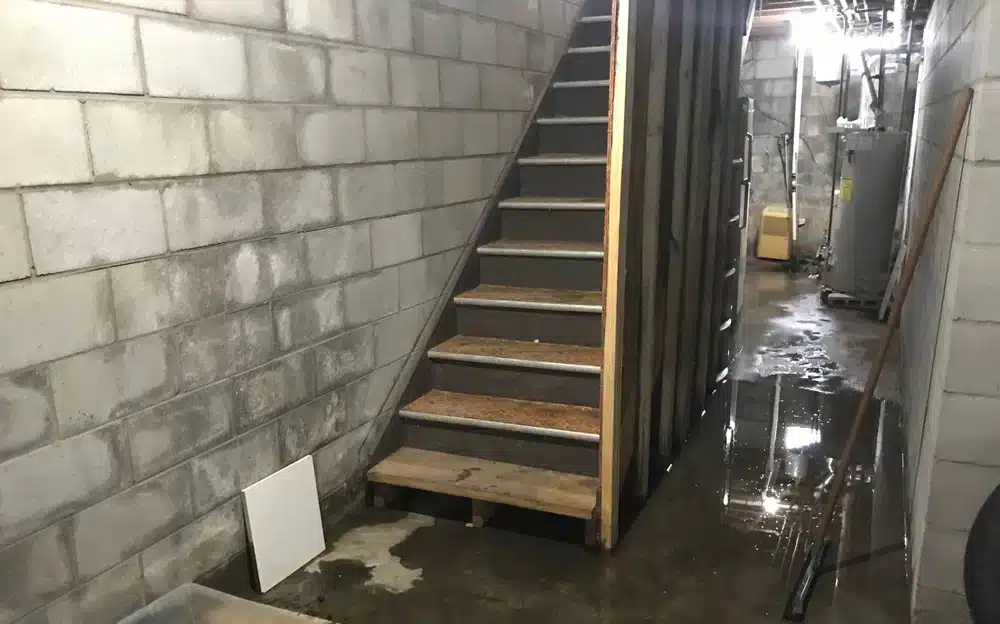Basement flooding is a common problem for many Michigan homeowners. The city’s flat landscape, aging sewer systems, and frequent heavy rain or snow make basement flooding in Michigan more likely, especially during storms or sudden snowmelt. When water gets into your basement, it can ruin your belongings, lead to expensive repairs, and even weaken your home’s structure. In some cases, it can also cause mold and mildew. The good news? If you know the causes of basement flooding in Michigan and spot the early warning signs, you can take steps to prevent damage. Below, we explain why flooding happens so often in Michigan homes.
Why Is My Home’s Basement Flooding?
If you’ve found water in your basement, you’re not alone; many Michigan homeowners face the same issue. Let’s look at the most common reasons this happens and what might be causing it in your home.
Heavy Rainfall and Storm Surges
Michigan gets a lot of heavy rain, especially in the spring and summer. When this happens, the ground and city drains can’t keep up. This causes moisture to build up in the soil and leak into basements through cracks in the walls, the floors, or around the windows, even in newer homes.
Poor Drainage and Grading Around the Home
If your yard slopes toward your house, rainwater will flow straight to your foundation. Without proper grading, gutters, or downspouts, that water can accumulate and leak into your basement. This adds pressure on your basement walls and can lead to basement flooding. Many people don’t notice the signs of poor drainage until it’s too late.
Foundation Cracks and Structural Weaknesses
Even tiny cracks in your foundation can let water into your basement, especially after heavy rain or melting snow. Wet soil around your home puts pressure on the walls, making the cracks bigger over time. If the ground shifts or settles, it can make the problem worse.
Sump Pump Failure or Inadequate System
Your sump pump helps keep your basement dry during heavy rain. But if it stops working, because of a power outage or poor maintenance, or is too small for your home, water can flood your basement quickly. Many Michigan homes have old or weak sump pumps that can’t handle big storms. Without a working pump and a battery backup, your basement is at serious risk.
Blocked or Clogged Gutters and Drain Tiles
Gutters, downspouts, and drain tiles help move rainwater away from your home. But when they get clogged with leaves, dirt, or ice, water can overflow and pool around your foundation. If underground drain tiles are blocked or broken, water can soak into the ground and leak into your basement.
Rising Water Tables and Ground Saturation
After a lot of rain or melting snow, the ground around your home can be saturated with water. This causes the water table to rise. When that water has nowhere to go, it pushes up against your basement and can leak in through cracks or weak spots.
Warning Signs of Basement Flooding in Michigan Homes
Catching water problems early can save you from major damage and costly repairs. Here are some key signs that your basement might be at risk of flooding.
Musty Odors or Damp Smells
If your basement smells musty or damp, it’s a sign that moisture is getting in, even if you don’t see water yet. A basement that smells musty may be susceptible to moisture, so look for water stains, mold, or other signs that your home is damp.
Visible Water Stains on Walls or Floors
Brown or dark spots on your basement walls or floors usually mean water has leaked in. These stains often result from repeated leaks and are an early indication that basement flooding could recur if not addressed.
Cracks in Foundation Walls or Floor Slabs
Cracks in your basement walls or floors, especially if they get bigger over time, can let water in. These cracks show that pressure is building around your foundation and are a warning sign of possible basement flooding.
Peeling Paint or Efflorescence
If the paint on your basement walls is bubbling, peeling, or flaking, or if you see white, powdery deposits, called efflorescence, it means moisture is coming through the walls. These signs indicate that water is entering your basement, potentially leading to flooding.
Warped or Buckling Flooring
If your wood or laminate floors start to bend, swell, or buckle, it usually means there’s moisture under them. This hidden water can cause bigger flooding problems in your basement if you don’t fix it.
Persistent Humidity or Condensation
Foggy basement windows or water droplets on the pipes in your basement show that moisture levels are high. This means the basement doesn’t have enough airflow and could be at risk of flooding. Watching for these signs can help you catch water problems early and protect your home.
Rust on Appliances, Pipes, or Support Posts
Rust on your basement’s appliances, pipes, or support beams means there has been moisture in your basement for a while. Noticing rust early can help you fix moisture problems before they hurt your home.
Can Heavy Rainfall Alone Cause Basement Flooding?
Yes, heavy rain can, by itself, cause your basement to flood. When the ground is too saturated or your sump pump and drainage system can’t handle the water, it can start seeping in through cracks, walls, or window wells. Just one big storm can be enough if your basement isn’t well-protected.
How to Prevent Basement Flooding in Michigan
Taking simple steps to protect your basement can save you time, money, and stress. Here’s how you can keep your Michigan home dry and safe from flooding.
Routine Inspections and Maintenance
Regularly inspecting your home helps prevent basement flooding. Look at your foundation, sump pump, gutters, and drains to find small problems, like cracks or leaks, early. Addressing these issues in a timely manner can save you from more significant, costly damage and keep your basement dry.
Installing a Battery Backup for Sump Pumps
Big storms in Michigan can cause power outages, just when your sump pump is needed most. A battery backup keeps the pump working even if the power goes out, helping stop your basement from flooding. It’s an easy way to stay protected during bad weather.
Foundation Sealing and Waterproofing
To keep water out of your basement during Michigan’s rainy seasons, sealing and waterproofing your foundation is key. Pros can seal up cracks and install special barriers to prevent water from seeping through the walls and floors. Waterproofing is a simple but effective way to prevent leaks and flooding.
When to Call a Professional
Noticing water stains, musty smells, cracks, or even some water in your basement? Thinking about fixing it yourself? These may seem like small problems, but they often indicate larger issues, such as poor drainage or foundation damage. That’s why you should call a waterproofing expert like Bluebird CFW. We identify the root cause of any damage and provide lasting solutions, not just temporary fixes.
Don’t wait for the next storm to cause more damage. Contact Bluebird CFW today for expert waterproofing and foundation repair solutions in Michigan.





